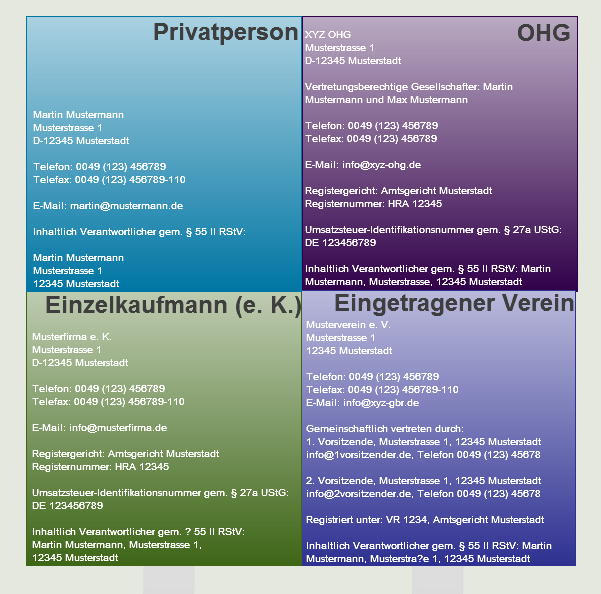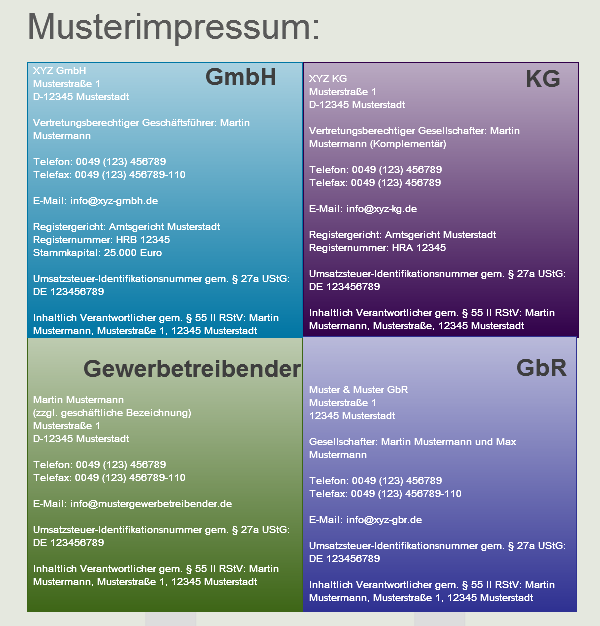Please note: The TMG (Telemedia Act) has been replaced by the DDG (Digital Services Act). However, the decision is likely still relevant in content. You can find an overview here. Please note: The TMG has been replaced by the DDG, but the decision likely remains relevant. An overview can be found here.
The question of whether foreign service providers must provide an imprint on their website in accordance with German law depends on whether the country of origin principle and the market place principle are applicable.
The country of origin principle and the market place principle are principles that regulate the legal position of suppliers of goods and services in a common and cross-border market.
Put simply, the country of origin principle means that service providers in the internal market only have to comply with the law of the country in which they are established. The market place principle, on the other hand, assigns the legal relationship to the place where competitive actions are to have an effect on the market participants (customers or competitors). A comparison of these definitions alone shows that the country of origin principle and the market place principle often conflict.
1. service providers with an establishment in a state of the European Union (EU)
In the area of e-commerce within the European Union (EU), the member states have long since agreed that the market place principle should be replaced by the country of origin principle (Directive on electronic commerce (2000/31/EC)).
The reason for this introduction of the country of origin principle in the EU is to prevent the restriction of freedom of establishment within the European Union due to different information requirements in the respective member states.
The German legislator has implemented the country of origin principle set out in the European Directive in Sections 2a and 3 of the German Telemedia Act (TMG).
As a result, websites of EU-based providers only have to comply with the requirements of the legal system of their country of establishment with regard to the European single market. The country of origin principle therefore applies: if you have your branch office with a website in Germany, you only have to comply with German law with regard to the website imprint, even if you advertise for customers in France on your website.
2. service providers with a branch in a non-European country (third country)
Whether service providers from third countries must also provide information on their website that complies with German law (or the laws of other European countries) is somewhat more complicated to assess.
Two court hearings can be used as examples here
Two court decisions can be considered in this regard, namely the decision of the Siegen Regional Court of 9 July 2013, case reference: 2 O 36/13 and the subsequent appeal decision of the Hamm Higher Regional Court of 17 December 2013, case reference: I-4 U 100/13.
These decisions were based on the question of whether the plaintiff based in Germany, which offered cruises in Egypt, was entitled to injunctive relief under competition law due to an incorrect website imprint against the defendant based in Egypt, which also offered cruises in Egypt.
The regional court initially appealed to dismissed the action on the grounds that a claim for injunctive relief under Section 1004 BGB would fail because the service provider residing abroad was not obliged to comply with the requirements of Section 5 TMG due to the country of origin principle regulated in Sections 2a and 3 TMG.
Rather, its responsibility would be governed by the provisions of private international law (note: private international law is a conflict of laws which is regulated differently from country to country and determines according to which national law the contract underlying the international legal transaction is to be assessed). In this respect, pursuant to Art. 29 para. 4 EGBGB in conjunction with Art. 28 para. 1 sentence 1 EGBGB or Art. 6 para. 4 lit. a in conjunction with Art. 4 para. 1 lit. a EGBGB. Art. 4 para. 1 lit. a) Rome I Regulation, Egyptian law applies. If the conclusion of the contract was subject to Egyptian law, nothing else would apply to the consumer information provisions required in this respect.
This view of the regional court was contradicted by the Hamm Higher Regional Court in its appeal decision of 17.12.13, case reference: I-4 U 100/13: In the opinion of the Hamm Higher Regional Court, the relevant information obligations in this case were not subject to contract law, but to competition law, i.e. non-contractual liability. The relevant conflict-of-law rules are therefore to be found in Regulation (EC) No. 864/2007 of the European Parliament and of the Council of 11 July 2007 on the law applicable to non-contractual obligations (so-called Rome II Regulation), so that according to the relevant Art. 6 para. 1 Rome II Regulation, the law of the place where the market interests of competitors or the collective interests of consumers may be affected (i.e. market place principle) is applicable. German law was therefore applicable to advertising aimed at German consumers and available in Germany.
According to the Higher Regional Court of Hamm, the country of origin principle of Section 3 TMG does not stand in the way of this judgement. This principle would not constitute a conflict rule, but should merely ensure that the freedom of establishment within the European Union is not impaired by different information regulations in the Member States. However, there is no impairment of the freedom of establishment within the Community if the application of the law leads to information rules being applied to a provider established outside the Community, for example in Egypt. In such a case, the country of origin principle is not affected.
3. conclusion
If one follows the case law of the Higher Regional Court of Hamm, the market place principle is therefore generally decisive for the applicability of the German information requirements with regard to the website imprint of a third-country national website operator, at least in the case of third-country national service providers. If the service provider from a third country therefore specifically advertises its website in Germany, for example in order to sell its products and services in Germany and therefore participates in German competition, the legal notice on its website must fulfil the German requirements.
For EU-based service providers, on the other hand, only the respective information obligations of the country of establishment should apply due to the country of origin principle, as a restriction of the freedom of establishment through the application of various national information obligations should be prevented. The legal notice on the website of an EU-based service provider therefore only needs to contain the information required by the laws of the country in which the service provider is established.
Nevertheless, caution is required in all cases. Whether the country of origin principle or the market place principle is applicable in a specific case or whether a German legal notice must be provided or not depends on many individual circumstances and should therefore always be checked individually.
If you would like to create a customised legal notice, you can use our free legal notice generator.
 Important Note: The content of this article has been prepared to the best of our knowledge and belief. However, due to the complexity and constant evolution of the subject matter, we must exclude liability and warranty. Important Note: The content of this article has been prepared to the best of our knowledge and understanding. However, the complexity and constant evolution of the subject matter make it necessary to exclude liability and warranty. This cannot replace legal advice. The use of the templates provided here is at your own risk.
Important Note: The content of this article has been prepared to the best of our knowledge and belief. However, due to the complexity and constant evolution of the subject matter, we must exclude liability and warranty. Important Note: The content of this article has been prepared to the best of our knowledge and understanding. However, the complexity and constant evolution of the subject matter make it necessary to exclude liability and warranty. This cannot replace legal advice. The use of the templates provided here is at your own risk.
If you need legal advice, feel free to call us at 0221 – 80187670 or email us at info@mth-partner.de.



